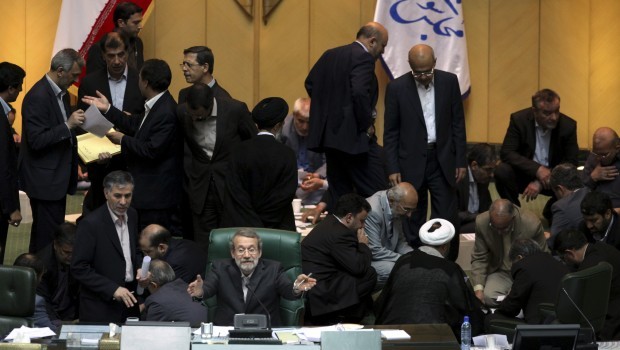
Iranian parliament speaker Ali Larijani, center, gestures as lawmakers count the votes of their colleagues for President Hassan Rouhani’s proposed Cabinet at the parliament in Tehran, Iran, on Thursday, August 15, 2013. (AP Photo/Ebrahim Noroozi)
Both Najafi and Meili-Monfared are known to be affiliated with the moderate reformist camp. Soltanifar is a relative unknown, but he is said to be inclined toward the reformist camp as well.
The education, youth and sport, and science ministries all work closely with the Iranian youth, and therefore have extensive influence on the next generation. The failure of these three reform-minded nominees to pass their confidence votes seems to be an attempt to delay change in these areas.
Now that 15 of his cabinet ministers have been approved, President Rouhani is expected to appoint three caretaker ministers for the positions that were not filled in Thursday evening’s confidence votes. He is also expected to appoint a number of deputies and advisers to help him implement his moderate agenda.
Mohammad-Ali Najafi garnered 142 votes in favor, 133 opposed and 9 abstentions, meaning he failed to secure a majority in his confidence vote.
The failed nominee to the education ministry holds a PhD in mathematics from the Massechussets Institute of Technology. He has lived in Iran since the 1979 revolution and served as Minister of Education—the post for which he was again nominated this month—under former prime minister Mir Hossein Mousavi and former president Akbar Hashemi Rafsanjani.
Najafi’s opponents accused him of being liberal-minded, and of being close to the Green Movement that was heavily involved in the unrest following the disputed 2009 presidential elections. His visits to the families of some wounded protestors, as well as his objections to plans to rename a square in commemoration of the pro-Ahmadinejad groups’ victory in the same protests, are said to be the reasons Parliament rejected his nomination.
Jaafar Meili-Monfared, who was proposed by Rouhani as the Minister of Science, Research and Technology, took only 105 votes in favor of his nomination. In contrast, 162 MPs were opposed and 15 abstained.
During the debate over his nomination, one MP played a film showing Meili-Monfared joining the student sit-in at the University of Tehran three days after the disputed 2009 elections.
Meili-Monfared served as caretaker of the same ministry during Khatami’s Administration after the resignation of the reformist then-minister when the reformist then-minister Mostafa Moeen resigned. He also served as deputy minister for technology affairs and students under Khatami, and from that role he is known as friendly to student activists.
Masoud Soltanifar also failed to receive enough votes to be appointed the Minister for Youth and Sport. His rejection may be related to the vested interest of politicians and state officials in wealthy soccer clubs and other sports teams.
The Ministry of Youth and Sport was only established two years ago, when the National Youth Organization and the Physical Education Organization were merged. The minister in charge of that portfolio has considerable power to shape state and private sporting and youth events.
